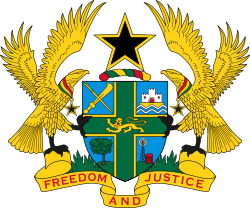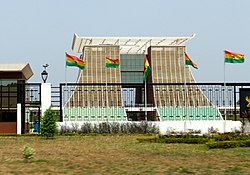Government of Ghana
Ghana used to be ruled by a military government. In 1992, Ghana allowed its citizens to elect its leaders, and in 1993, Ghana became a parliamentary democracy known as the Fourth Republic. The 1992 constitution splits powers between a president, parliament, cabinet, council of state, and an independent national court.
| Government of Ghana | |
|---|---|

| |
| Coat of Arms of the Republic of Ghana | |

| |
| Flagstaff House is the official residence and presidential palace. | |
| Government overview | |
| Formed | Founder's Day 68 years, 9 months Republic Day 65 years, 6 months 1992 Constitution 33 years, 7 months |
| Jurisdiction | Republic of Ghana |
| Headquarters | Accra, Greater Accra |
| Agency executives | Nana Akufo-Addo, President of Ghana Mahamudu Bawumia, Vice President of Ghana Sophia Akuffo, Chief Justice Aaron Mike Oquaye, Speaker of Parliament |
| Website | |
| www | |
Anyone can vote in Ghana, regardless of their gender, race, background, money, and so on.[1]
Government
Political parties became legal in Ghana in 1992. Right now, there are 20 political parties. The two most dominant ones are the National Democratic Congress and the New Patriotic Party.
The National Democratic Congress won elections in 1992, 1996, 2008 and 2012. The New Patriotic Party won elections in 2000, 2004, and 2016.[2]
Relations to other countries
Ghana has believed in the non-aligned movement, meaning that it does not form official relationships with other countries. However, Ghana prefers to cooperate with other countries.
Ghana is a member of the United Nations and the African Union.[3] Many people from Ghana serve as diplomats for those kinds of groups.
Regions
There are ten regions of the Republic of Ghana which are divided into 6 metropolitan assemblies, 55 Municipal assemblies, and 216 districts.[4]
Government Of Ghana Media
Ghana presidential election, 2012 result according to the Electoral Commission of Ghana.*----* National Democratic Congress New Patriotic Party
Ghanaian diplomat Kofi Annan served as Secretary-General of the United Nations for nine years until 2006.
References
- ↑ "Government and Politics". A Country Study: Ghana (La Verle Berry, editor). Library of Congress Federal Research Division (November 1994). (Note: This article incorporates text from this source, which is in the public domain.) Lcweb2.loc.gov.
- ↑ "Electoral Commission of Ghana". www.ec.gov.gh. Retrieved 2018-02-27.
- ↑ "Official page of Nations Permanent Mission of Ghana to the United Nations". Author: un.int. United Nations. 20 September 2011. Retrieved 20 May 2012.
- ↑ "Ghana at a glance". ghana.gov.gh. Government of Ghana. Retrieved 1 June 2013.

